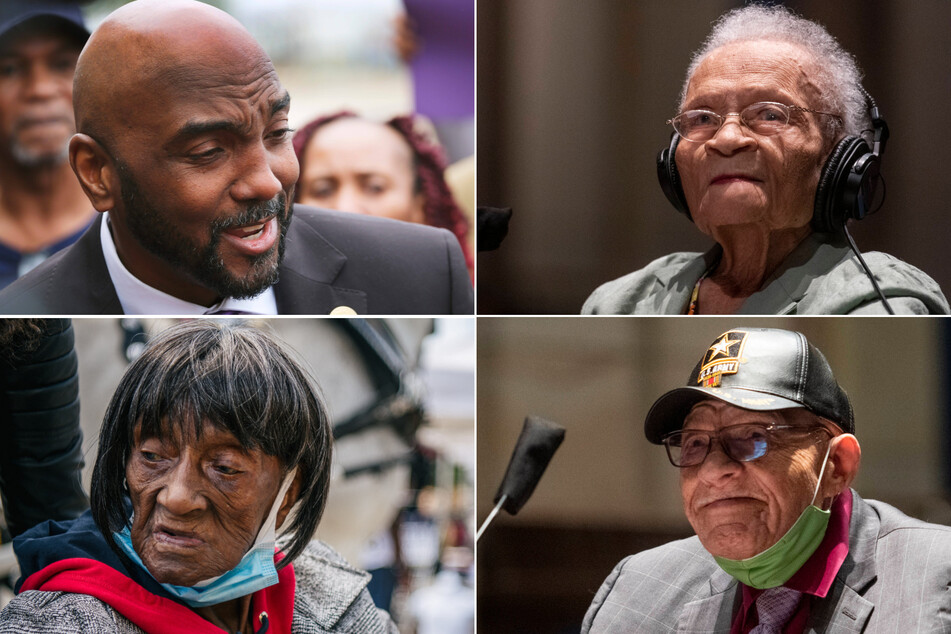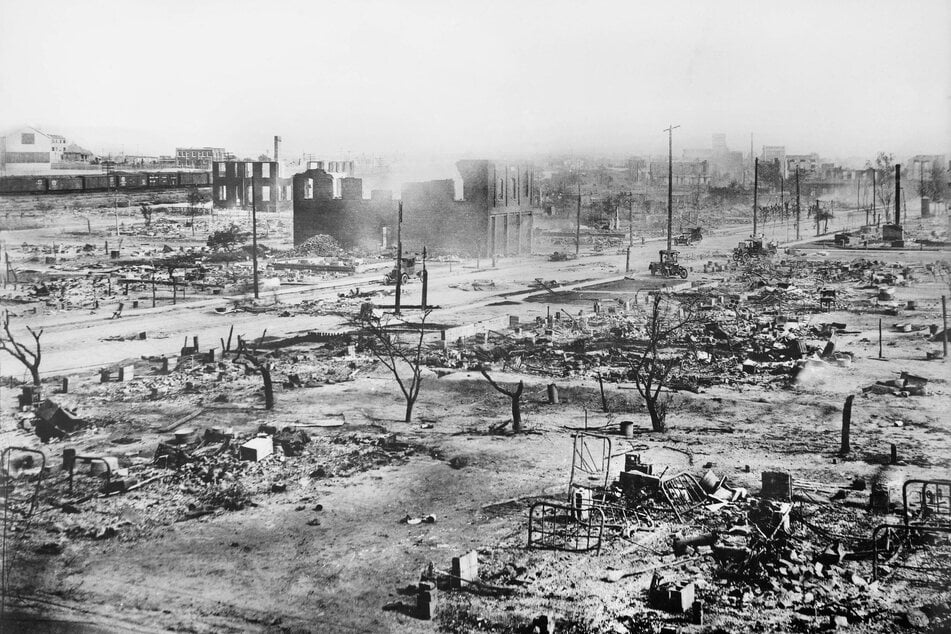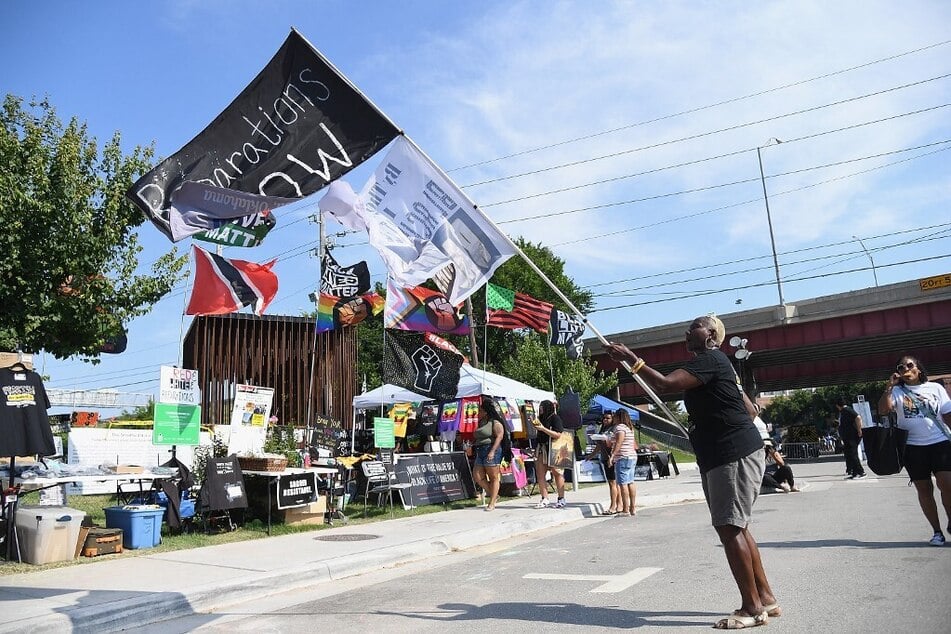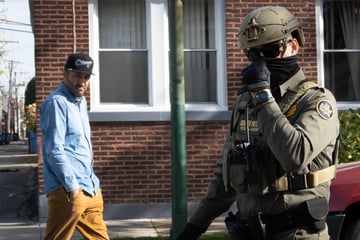Tulsa Race Massacre survivors appeal dismissed reparations lawsuit at Oklahoma Supreme Court
Oklahoma City, Oklahoma - The legal team representing the last three known living survivors of the 1921 Tulsa Race Massacre is challenging the dismissal of their historic reparations lawsuit with a new appeal before the Oklahoma Supreme Court.

Legal representatives for Viola Ford Fletcher (109), Lessie Benningfield Randle (108), and Hughes Van Ellis (102) gathered outside the Oklahoma Supreme Court on Monday seeking a reversal of Tulsa County District Judge Caroline Wall's decision to dismiss their case for redress.
"If we are truly a nation of laws, this is the case that will prove it, because for 102 years [...] they've been waiting, just like every other victim and survivor of the massacre, for just an opportunity to have their day in court," said lead attorney and Justice For Greenwood founder Damario Solomon-Simmons.
The lawsuit, launched in 2020, accuses the City of Tulsa, Tulsa County, the Tulsa Regional Chamber, the Oklahoma National Guard, and other defendants of violating the state's public nuisance law, and argues that the City of Tulsa has unjustly enriched itself off cultural tourism related to the massacre.
The suit outlasted several attempts at dismissal before Wall backpedaled on prior decisions and threw out the case.
The conservative judge did not provide an explanation to the survivors or their attorneys, who found out about the news from a reporter.
Tulsa Race Massacre survivors fight for truth and repair

Fletcher, Randle, and Ellis were just children when their community was razed and their lives forever changed.
Known as one of the worst acts of racial violence in US history, the Tulsa Race Massacre saw a mob of white law enforcement officers and civilians murder hundreds of Black people in the Greenwood District, known as Black Wall Street.
The vigilantes even dropped firebombs on the community from World War I-issue planes, decimating 40 blocks of Black homes and businesses.
White authorities sought to cover up evidence of the attack by destroying police records and burying bodies in unmarked mass graves.
But for Fletcher, Randle, and Ellis, the horrors of the massacre could not be so easily buried and dismissed.
The three survivors have vowed not to let the latest legal defeat stand in the way of their fight for accountability and repair. The appeal before the Supreme Court is the fulfillment of that promise, with legal experts confident that the law and the facts are on their side.
"If our Supreme Court upholds their constitutional duty – their oath – and looks at the law, there's only one decision that can be made, and that decision is to swiftly, quickly reverse Judge Caroline Wall's unjust and unlawful decision to dismiss, send this case back to the district court, and allow us to move forward with discovery," Solomon-Simmons insisted.
Tulsa Race Massacre survivors face higher legal hurdles

Legal experts pointed out that Wall established higher legal hurdles for the Tulsa Race Massacre survivors than for any other litigants in the state, and said that if the Supreme Court doesn't reverse her decision, it could have a lasting effect on pleading standards.
"We are the only plaintiffs in Oklahoma required to state our remedy in advance of engaging in the sort of fact finding that's usually permitted by Oklahoma law," explained Eric Miller, professor of law at Loyola Marymount University. "That's not only unfair. It's literally unprecedented, and it will impact each and every case filed by plaintiffs in Oklahoma going forward unless the Supreme Court steps in and forces Judge Wall to do the right thing and apply the right standard."
Randall Adams of Schulte Roth & Zabel LLP also noted that Wall had dismissed the lawsuit with no mention of unjust enrichment. The omission came in spite of an agreement in official court records guaranteeing the claim would not be thrown out so long as certain paragraphs were removed.
Supporters of the reparations case warned justices that all eyes are on the Oklahoma Supreme Court – with the very legitimacy of the US legal system under scrutiny.
"We have a judge in Caroline Wall who has put up a wall of injustice," said Oklahoma state Representative and Greenwood descendant Regina Goodwin. "We have trials just to get into trial. That's what has been the history of many Black folks as long as I've been living and before I was born and long after I'll be gone."
"For some reason, law is not applied the same to different folks. That's really what's happening here," she added.
Cover photo: Collage: IMAGO / USA TODAY Network, Brandon Bell / GETTY IMAGES NORTH AMERICA / Getty Images via AFP, IMAGO / ZUMA Wire & IMAGO / MediaPunch

